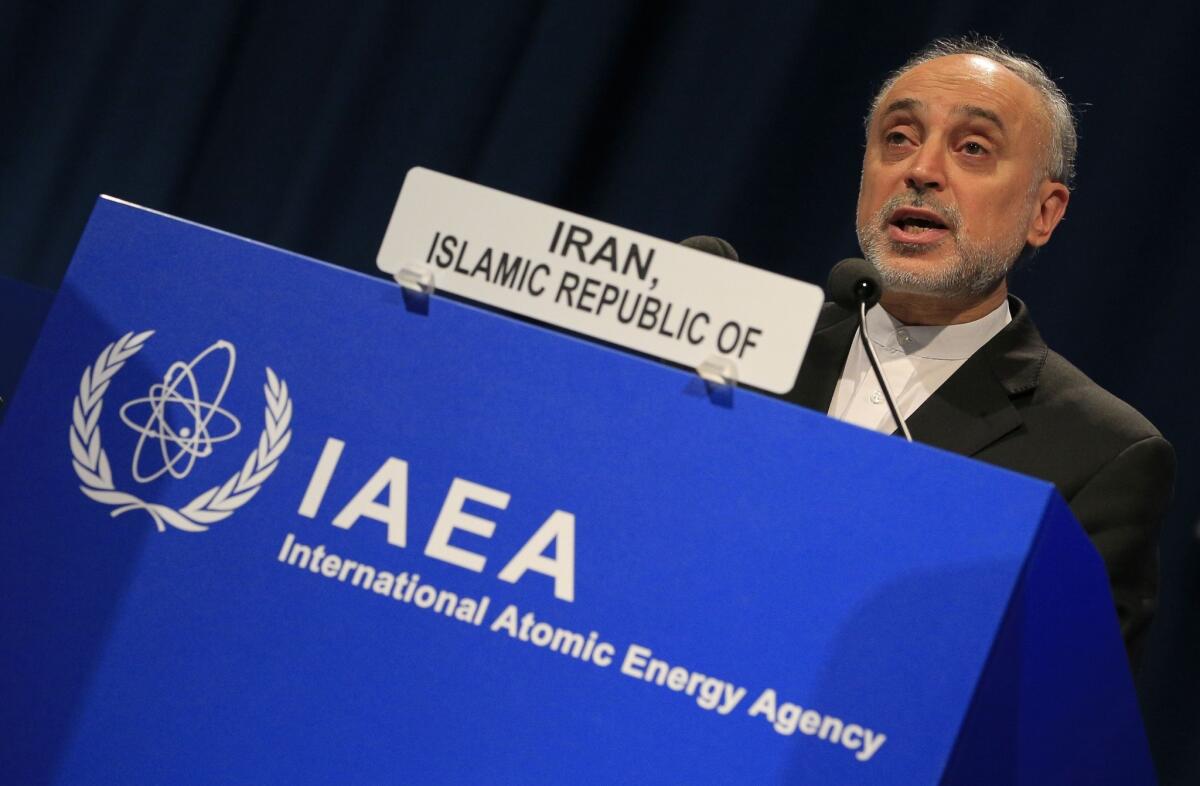Iran seesawing on social media, nuclear policy may reflect infighting

- Share via
TEHRAN -- One day Facebook is a handy way for Iranian government ministers to confer with the people. The next day it can be denounced as “a Zionist tool.”
As with its on-again, off-again claim to want better relations with the West, Iran’s recent flip-flops on social media reflect infighting within Tehran’s religious and elected leaderships, analysts said Tuesday.
Iranians were jubilant on Monday when the usual blockages and filters on social media sites like Twitter and Facebook fell by the wayside. In the wake of other signs that the new leadership of President Hassan Rouhani was embracing the tweets and likes of modern communication, Iranian social media users thought the government was relaxing the strictures imposed in 2009 after massive demonstrations organized online to vent anger over the disputed reelection of President Mahmoud Ahmadinejad.
By Tuesday morning, though, the government firewall was back in place, forcing those seeking contact with prohibited groups or websites to resume the cumbersome task of circumventing the censors.
“God willing, it was just a mistake,” Iranian media quoted Abdolsamad Khoramabadi, head of the committee overseeing Internet regulation, as saying of the brief lapse in censorship. “But if it was due to delinquency, based on computer crimes regulations, those who did it must be punished.”
One analyst close to the government attributed the lapse to conflicting views at the highest levels about how much information freedom is appropriate in Iran.
“There is a dispute over whether to lift the blockages on social networks or not, and I think the controls will remain for the foreseeable future,” he told The Times.
The retreat on social media policy appeared to conflict with Rouhani’s encouragement of his Cabinet ministers to open Facebook accounts to enhance the leadership’s accessibility. Foreign Minister Mohammad Javad Zarif even turned to social media to send Rosh Hashana greetings to the global Jewish community -- a striking contrast with the Ahmadinejad government’s expressed wish to see Israel wiped off the map.
As evidence of residual opposition to both social media and better relations with the outside world, several hard-liners have denounced Facebook and its spreading popularity in government echelons as “a Zionist tool.”
Conflicting signals are also emanating from Tehran on its disputed nuclear programs. While constantly reminding U.S. and Western officials of Iran’s sovereign right to enrich uranium for civilian nuclear uses, the new negotiators appointed by Rouhani have been making public pronouncements of wanting to ease suspicions that Tehran is clandestinely acquiring the capability to manufacture nuclear weapons.
Iranian Foreign Ministry spokeswoman Marzieh Afkham confirmed on Tuesday that Rouhani and President Obama have exchanged letters over the last month. It was a rare incident of official communication between leaders whose nations have lacked normal diplomatic relations since 1980, when Islamic revolutionaries were holding 52 Americans hostage at their besieged embassy in Tehran.
The quiet contact initiated by Obama’s letter of congratulation to Rouhani after his Aug. 3 inauguration has given rise to expectation that the two presidents might meet on the sidelines of next week’s U.N. General Assembly gathering in New York.
At a meeting in Vienna of the International Atomic Energy Agency on Monday, Iranian atomic energy agency chief Ali Akbar Salehi said of the decadelong nuclear dispute with the United States that Iran “will facilitate the resolution of this issue if the other side is willing.”
As a gesture of its interest in breaking the impasse, Iran is prepared to decommission its uranium enrichment facility at Fordow in exchange for the West lifting withering economic sanctions, the German news magazine Der Spiegel reported in this week’s edition, citing unnamed intelligence sources.
The reported offer, if genuine, represents compromise from the previous Iranian government’s insistence on enriching uranium to 20% purity, which can be quickly converted to weapons-grade fuel and is beyond what is needed for civilian nuclear projects like power generation. But proposing to close Fordow would be received in Washington as an opening bid, at best, in negotiations that Rouhani has hinted he wants to kick-start during his New York visit.
Both the IAEA efforts to gain access to Tehran’s nuclear facilities for inspection and Iran’s negotiations with six world powers have been idle since spring, when the Iranian presidential campaign was underway and compromise on the nuclear issue was off the table for political reasons.
Nuclear and foreign policy have long been controlled by the religious leadership under Ayatollah Ali Khamenei, not Rouhani’s Cabinet. But Rouhani announced this month that responsibility for nuclear policy negotiations in Vienna and with the six-power forum -- the United States, Russia, China, Britain, France and Germany -- had been transferred to the elected government. That was a move seen by analysts as conveying Khamenei’s blessing for a new approach after the combative posture struck by Ahmadinejad during his eight years in office.
Khamenei also weighed in on the public pronouncements of a new day ahead on the nuclear front in a televised speech Tuesday. The supreme leader, who would have the last say in any nuclear deal reached in either forum, professed Iran’s “flexibility” in the negotiations, although he added the caveat that Iranian delegates needed to keep in mind that the country has enemies among its interlocutors.
“A wrestler may exercise flexibility for a tactical reason,” Khamenei said, according to the Mehr news agency. “But he won’t forget who his rival is and what his goal is.”
ALSO:Brazil postpones state visit to U.S. over Snowden spying leaks
Court upholds order freezing assets of Egypt’s Islamist leaders
U.N. probe confirms Syrian chemical weapons use: Now the hard part
Twitter: @cjwilliamslat
Special correspondent Mostaghim reported from Tehran and Times staff writer Williams from Los Angeles.
More to Read
Sign up for Essential California
The most important California stories and recommendations in your inbox every morning.
You may occasionally receive promotional content from the Los Angeles Times.











